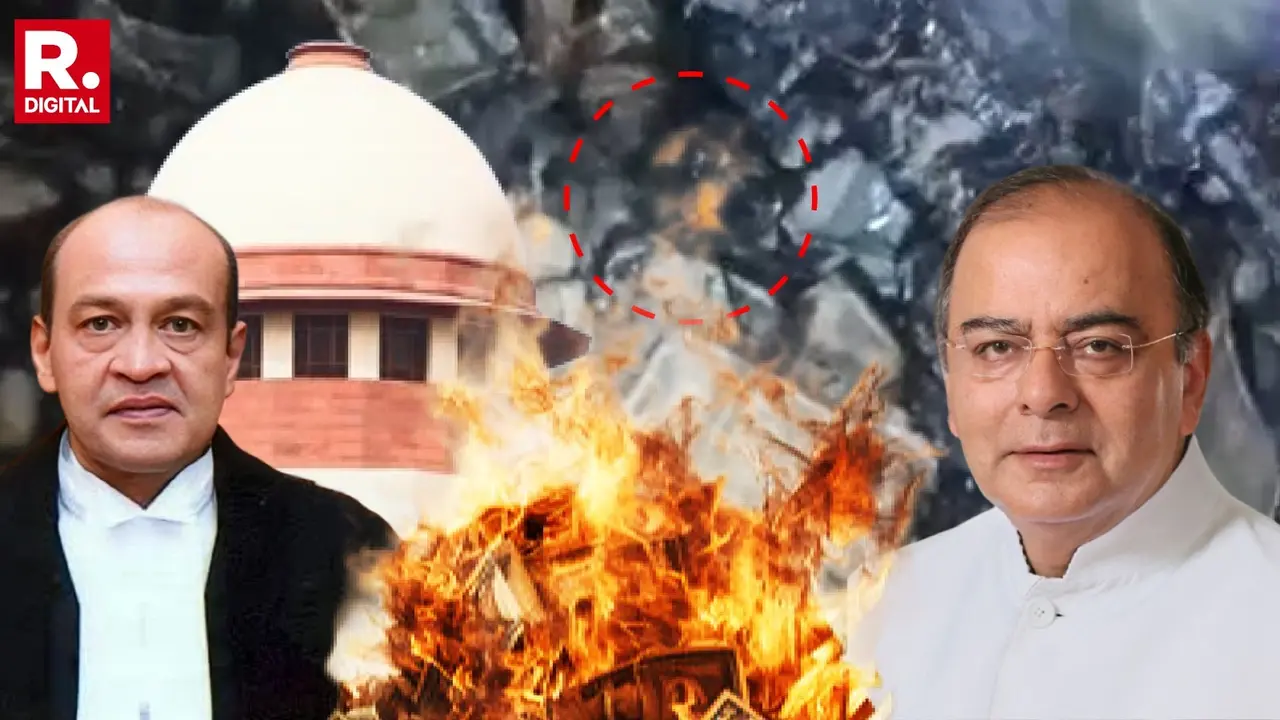Updated 25 March 2025 at 18:25 IST
Burning Cash, Fading Trust: Why Arun Jaitley’s Call For Judicial Reforms Still Matters
Jaitley had highlighted key judicial concerns: The appointment process, quality of justice, & accountability, stressing the need for urgent reforms | WATCH
- India News
- 4 min read

New Delhi: Amid the ongoing controversy surrounding Justice Yashwant Varma — the Delhi High Court judge at whose home a pile of burnt cash was found on Holi after firefighters extinguished a blaze — a past parliamentary speech by late Finance Minister Arun Jaitley has resurfaced, reigniting the debate on judicial accountability.
Jaitley, a seasoned lawyer and BJP leader, had long advocated for greater transparency, efficiency, and integrity in India's judicial system. His remarks in Parliament now serve as a stark reminder of the urgent need for reforms.
Judiciary’s Divine Responsibility
In his address, Jaitley can be seen speaking about the almost divine role judges play in determining the fate of individuals. "A judge almost performs a divine function when there are disputes between ordinary humans. By the civilized court that we have in India and by the rule of law that we are governed by, we make him the arbiter of our fate," he stated.
Stressing the immense power wielded by the judiciary, the late leader had highlighted the expectation that judges should embody the highest standards of intellect, ethics, and integrity.
Advertisement
Concerns Over Judicial Appointments
Jaitley, in his speech almost a decade ago, had outlined three major concerns in the judiciary - The appointment process, the quality of justice dispensed, and judicial accountability. He traced the evolution of judicial appointments, starting from the 1950s when government consultation was central to the selection of judges. During the early decades, a balance existed between the judiciary and executive, ensuring high-quality appointments without controversy.
However, the 1970s saw tensions emerge between the judiciary and the government, culminating in judicial supersessions in 1973. In 1982, a Supreme Court ruling upheld executive primacy in judicial appointments. Yet, in 1993, the balance shifted dramatically when the Supreme Court reinterpreted "consultation" to mean "binding advice," making the Chief Justice’s recommendations final. This led to the formation of the collegium system in 1998, where a group of judges collectively decided appointments.
Advertisement
Jaitley had questioned whether vesting appointment power in a single person, or even a small group, was ideal. "Even the most eminent individuals can err. Should such a paramount function depend solely on the personality and preferences of one person?" he asked.
He noted that despite removing executive influence, the collegium system had slowed down the appointment process considerably, leading to over a hundred judicial vacancies at a given time.
Growing Nepotism in The Judiciary - A Sunstroke Problem
Jaitley had expressed concerns over declining judicial quality, stating that many eminent lawyers had declined judgeship due to unattractive career prospects. He further pointed out an increasing trend of judicial nepotism, referring to it as the "sunstroke problem," where relatives of judges were being unduly favored.
One of the most striking revelations from his speech was regarding accountability. Jaitley revealed that when the government sought data on delayed judgments from High Courts, one court refused, arguing that disclosing such information "impinges upon judicial independence." He strongly opposed this argument, stating that judicial independence should not come at the cost of transparency.
The Need for a National Judicial Commission
Jaitley supported the formation of a National Judicial Commission (NJC) to oversee judicial appointments and address accountability issues. He insisted that such a commission must maintain a balance, neither dominated by the judiciary nor excessively influenced by the executive. "The principal purpose of this institution must be to ensure judicial independence and dignity while introducing an element of accountability," he said.
One of the key recommendations he supported was making truth a valid defense in contempt cases.
"If truth is a defense in defamation, why should it not be a defense in contempt actions? If someone exposes judicial misconduct, should they live under a cloud forever, or should there be a mechanism to clear their name?" he argued.
A Reform Left Unfinished
Jaitley concluded his address by emphasizing that judicial reforms were crucial for maintaining public trust. "We in the government are seriously concerned about these issues. Our consideration of this matter is at a very advanced stage, and in a few days or weeks, we will announce our decision," he had assured.
However, even years later, the judicial system remains plagued by several of the same issues Jaitley raised. The ongoing controversy surrounding the judge burning cash scandal has reignited calls for reform, making Jaitley’s words more relevant than ever. As India grapples with another judicial crisis, his speech serves as a crucial lesson that without accountability, even the most powerful institutions can falter.
Watch His Full Speech Below:-
Get Current Updates on India News, Entertainment News, Cricket News along with Latest News and Web Stories from India and around the world.
Published By : Surabhi Shaurya
Published On: 25 March 2025 at 18:05 IST
